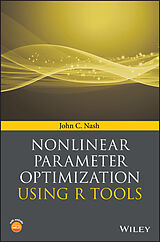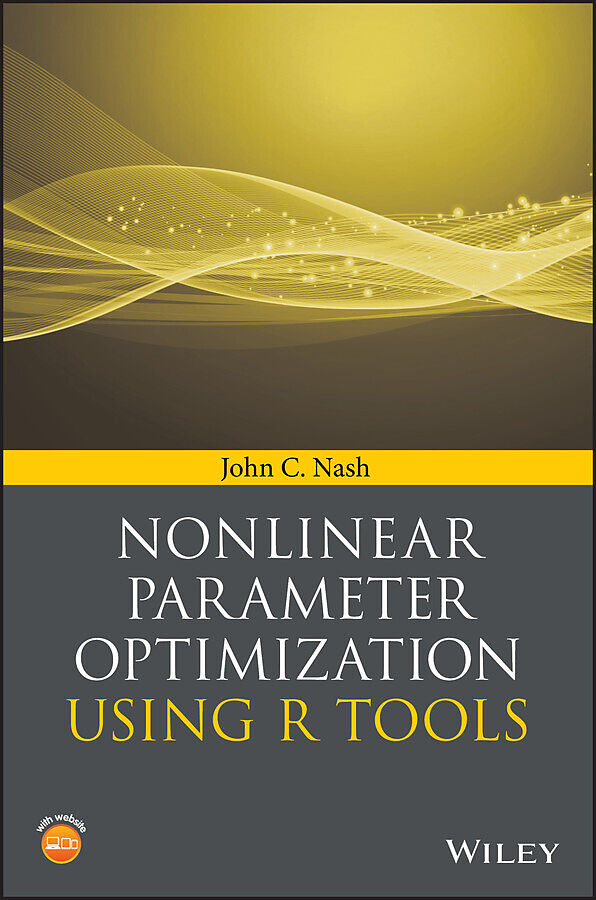Nonlinear Parameter Optimization Using R Tools
Einband:
E-Book (epub)
EAN:
9781118883969
Untertitel:
Englisch
Genre:
Mathematik
Autor:
John C. Nash
Herausgeber:
Wiley
Anzahl Seiten:
304
Erscheinungsdatum:
03.04.2014
ISBN:
978-1-118-88396-9
Nonlinear Parameter Optimization Using R
John C. Nash, Telfer School of Management, University of Ottawa, Canada
A systematic and comprehensive treatment of optimization software using R
In recent decades, optimization techniques have been streamlined by computational and artificial intelligence methods to analyze more variables, especially under non-linear, multivariable conditions, more quickly than ever before.
Optimization is an important tool for decision science and for the analysis of physical systems used in engineering. Nonlinear Parameter Optimization with R explores the principal tools available in R for function minimization, optimization, and nonlinear parameter determination and features numerous examples throughout.
Nonlinear Parameter Optimization with R:
* Provides a comprehensive treatment of optimization techniques
* Examines optimization problems that arise in statistics and how to solve them using R
* Enables researchers and practitioners to solve parameter determination problems
* Presents traditional methods as well as recent developments in R
* Is supported by an accompanying website featuring R code, examples and datasets
Researchers and practitioners who have to solve parameter determination problems who are users of R but are novices in the field optimization or function minimization will benefit from this book. It will also be useful for scientists building and estimating nonlinear models in various fields such as hydrology, sports forecasting, ecology, chemical engineering, pharmaco-kinetics, agriculture, economics and statistics.
Autorentext
JOHN C. NASH, Telfer School of Management, University of Ottawa, Canada
Zusammenfassung
Nonlinear Parameter Optimization Using R
John C. Nash, Telfer School of Management, University of Ottawa, Canada A systematic and comprehensive treatment of optimization software using R In recent decades, optimization techniques have been streamlined by computational and artificial intelligence methods to analyze more variables, especially under nonlinear, multivariable conditions, more quickly than ever before. Optimization is an important tool for decision science and for the analysis of physical systems used in engineering. Nonlinear Parameter Optimization with R explores the principal tools available in R for function minimization, optimization, and nonlinear parameter determination and features numerous examples throughout. Nonlinear Parameter Optimization with R: Provides a comprehensive treatment of optimization techniques Examines optimization problems that arise in statistics and how to solve them using R Enables researchers and practitioners to solve parameter determination problems Presents traditional methods as well as recent developments in R Is supported by an accompanying website featuring R code, examples and datasets Researchers and practitioners who have to solve parameter determination problems who are users of R but are novices in the field optimization or function minimization will benefit from this book. It will also be useful for scientists building and estimating nonlinear models in various fields such as hydrology, sports forecasting, ecology, chemical engineering, pharmaco-kinetics, agriculture, economics and statistics.
Inhalt
Preface xv 1 Optimization problem tasks and how they arise 1 1.1 The general optimization problem 1 1.2 Why the general problem is generally uninteresting 2 1.3 (Non-)Linearity 4 1.4 Objective function properties 4 1.4.1 Sums of squares 4 1.4.2 Minimax approximation 5 1.4.3 Problems with multiple minima 5 1.4.4 Objectives that can only be imprecisely computed 5 1.5 Constraint types 5 1.6 Solving sets of equations 6 1.7 Conditions for optimality 7 1.8 Other classifications 7 References 8 2 Optimization algorithms an overview 9 2.1 Methods that use the gradient 9 2.2 Newton-like methods 12 2.3 The promise of Newton's method 13 2.4 Caution: convergence versus termination 14 2.5 Difficulties with Newton's method 14 2.6 Least squares: GaussNewton methods 15 2.7 Quasi-Newton or variable metric method 17 2.8 Conjugate gradient and related methods 18 2.9 Other gradient methods 19 2.10 Derivative-free methods 19 2.10.1 Numerical approximation of gradients 19 2.10.2 Approximate and descend 19 2.10.3 Heuristic search 20 2.11 Stochastic methods 20 2.12 Constraint-based methods mathematical programming 21 References 22 3 Software structure and interfaces 25 3.1 Perspective 25 3.2 Issues of choice 26 3.3 Software issues 27 3.4 Specifying the objective and constraints to the optimizer 28 3.5 Communicating exogenous data to problem definition functions 28 3.5.1 Use of global data and variables 31 3.6 Masked (temporarily fixed) optimization parameters 32 3.7 Dealing with inadmissible results 33 3.8 Providing derivatives for functions 34 3.9 Derivative approximations when there are constraints 36 3.10 Scaling of parameters and function 36 3.11 Normal ending of computations 36 3.12 Termination tests abnormal ending 37 3.13 Output to monitor progress of calculations 37 3.14 Output of the optimization results 38 3.15 Controls for the optimizer 38 3.16 Default control settings 39 3.17 Measuring performance 39 3.18 The optimization interface 39 References 40 4 One-parameter root-finding problems 41 4.1 Roots 41 4.2 Equations in one variable 42 4.3 Some examples 42 4.3.1 Exponentially speaking 42 4.3.2 A normal concern 44 4.3.3 Little Polly Nomial 46 4.3.4 A hypothequial question 49 4.4 Approaches to solving 1D root-finding problems 51 4.5 What can go wrong? 52 4.6 Being a smart user of root-finding programs 54 4.7 Conclusions and extensions 54 References 55 5 One-parameter minimization problems 56 5.1 The optimize() function 56 5.2 Using a root-finder 57 5.3 But where is the minimum? 58 5.4 Ideas for 1D minimizers 59 5.5 The line-search subproblem 61 References 62 6 Nonlinear least squares 63 6.1 nls() from package stats 63 6.1.1 A simple example 63 6.1.2 Regression versus least squares 65 6.2 A more difficult case 65 6.3 The structure of the nls() solution 72 6.4 Concerns with nls() 73 6.4.1 Small residuals 74 6.4.2 Robustness singular gradient woes 75 6.4.3 Bounds with nls() 77 6.5 Some ancillary tools for nonlinear least squares 79 6.5.1 Starting values and self-starting problems 79 6.5.2 Converting model expressions to sum-of-squares functions 80 6.5.3 Help for nonlinear regression 80 6.6 Minimizing Rfunctions that compute sums of squares 81 6.7 Choo...

Leider konnten wir für diesen Artikel keine Preise ermitteln ...
billigbuch.ch sucht jetzt für Sie die besten Angebote ...
Die aktuellen Verkaufspreise von 6 Onlineshops werden in Realtime abgefragt.
Sie können das gewünschte Produkt anschliessend direkt beim Anbieter Ihrer Wahl bestellen.
Loading...
Die aktuellen Verkaufspreise von 6 Onlineshops werden in Realtime abgefragt.
Sie können das gewünschte Produkt anschliessend direkt beim Anbieter Ihrer Wahl bestellen.
| # | Onlineshop | Preis CHF | Versand CHF | Total CHF | ||
|---|---|---|---|---|---|---|
| 1 | Seller | 0.00 | 0.00 | 0.00 |
